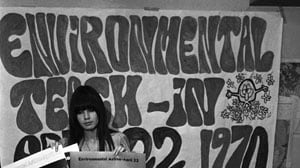In 1970, a bunch of 20-somethings organized the first Earth Day to raise awareness about pressing environmental problems. Back then, the environmental movement had an immediacy that it now lacks. As Arturo Sandoval, one of the original organizers put it, in 1970 "you could say, 'Have you been down to the river lately?' And people would say, 'Oh my God, I don't even let my kids go there.'" In contrast, he said, "Global warming, to most people, is an abstract issue." The first Earth Day was intended as a one-time event but it galvanized environmentalists, whose work led to federal laws on dirty air and poisoned water, and the creation of the EPA. Now, at 40, Earth Day is grappling with less palpable problems, like greenhouse grasses that are neither visible nor smellable. A poll by George Mason, Yale, and American universities showed that people concerned about climate change are more than eight times more likely to buy "green" products than to contact their elected official multiple times, belying the movement's historical anti-consumerism. Most disappointingly, on this anniversary, our environmental footprint is not smaller than it was in 1970, and activists are not yet able to celebrate the signing of a successful global climate agreement in Copenhagen.
Read it at The Washington Post





